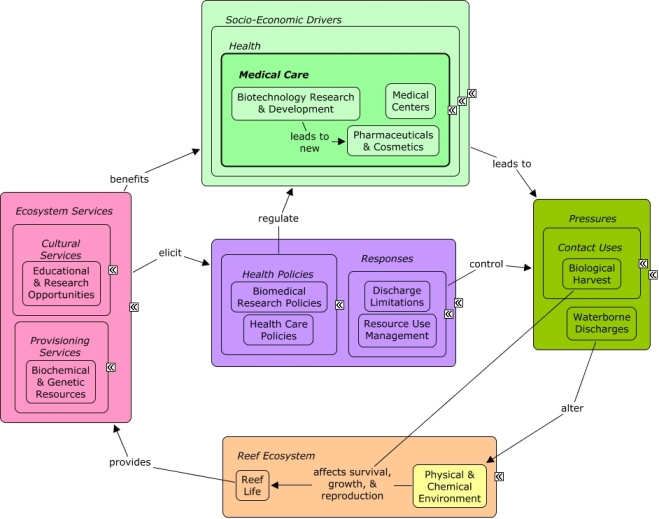ReefLink Database

Pharmaceuticals & Cosmetics
Pharmaceuticals and Cosmetics industries are engaged in manufacturing drugs, medicines and related products for human or animal use.
CMap

CMap Description
Pharmaceuticals and Cosmetics companies may undertake one or more of several processes, including basic processes, such as chemical synthesis, fermentation, distillation and solvent extraction; grading, grinding and milling; and packaging in forms suitable for internal and external use, such as tablets, vials, ampoules and ointments. Pharmaceutical facilities may produce waste discharges or atmospheric emissions during processing. These activities can increase pollutant runoff into the reef ecosystem. Pharmaceutical companies are subject to a variety of laws and regulations regarding the patenting, testing and ensuring safety and efficacy and marketing of drugsCitations
More than 50 citations. Click here to load.
| Citation | Year | Study Location | Study Type | Database Topics |
|---|
Management Options
| Management Option | Description | Sources | Database Topics |
|---|---|---|---|
| Economic Markets & Policy: Regulate International Trade of Reef Species | Many coral reef species are harvested internationally for a variety of markets including the aquarium trade, food, curios, jewelry and pharmaceuticals. The US is the largest importer for many of these markets. The US strictly limits extraction of stony coral and many reef species in its waters; but as a major importer and consumer of coral reef species, more actions can be taken to decrease the demand on international imports. Setting and enforcing regulations on what can be imported (such as Convention on International Trade in Endangered Species CITES) is one approach that has been taken. More information is needed, leaving room to collect trade data and assess the impacts of extraction techniques to find sustainable methods. Demand for species collected this way will be increased with greater transparency to consumers, which can be accomplished through certifications for environmentally cognoscente collectors and those using alternatives like aquaculture and coral farming. Continued participation in Asia Pacific Economic Cooperation (APEC) and International Coral Reef Initiative (ICRI) is also beneficial. | U.S. Coral Reef Task Force. 2000. International Trade in Coral and Coral Reef Species: The Role of the United States. Report of the Trade Subgroup of the International Working Group to the U.S. Coral Reef Task Force, Washington, D.C. World Resource Institute International Marinelife Alliance, editor. 1997. Sullied Seas. WRI, Washington D.C. U.S. Coral Reef Task Force. 2000. The National Action Plan to Conserve Coral Reefs. Washington, D.C. |
Accidental & Illegal Harvest; Aquaculture; Aquarium & Pet Trade; Aquarium Stock; Biological Harvest; Biological Monitoring, Mapping, & Scientific Research; Collaboration & Partnering; Coral; Corporate Responses; Cultural Policies; Designate Protected Species; Economic Markets & Policies; Environmental Education & Outreach; Invertebrate Harvest; Invertebrates; Live Collection; Manufacturing & Trade; Manufacturing & Trade Policies; Marine Products; Ornamental Jewelry & Art; Pharmaceuticals & Cosmetics; Pharmaceuticals & Cosmetics Sources; Political Pressure; Souvenir & Decorative Trade; Sponges; Stony Coral; Toxics; Wholesale & Retail Trade |
Laws
| Legal Citation | Purpose of Law | Management Organization | Database Topics |
|---|
